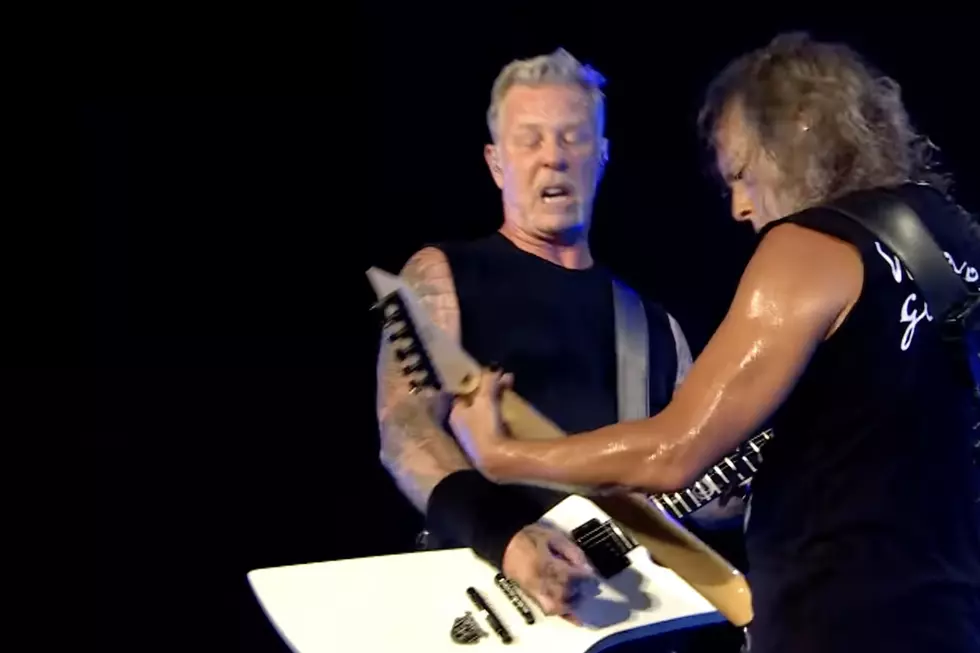
Metallica, ‘Kill ‘Em All’ – Album Overview
They are fully engrained in mainstream music today, but in the early ‘80s Metallica were a young band helping pioneer speed/thrash metal, which back then was raw, intense and downright dangerous. Their debut album Kill ‘Em All changed everything for many music fans.
Before the Debut
Before Kill ‘Em All was their 1982 demo No Life ‘Til Leather. Recorded at Chateau East Studio in Tuscin, Calif., the lineup for the seven-track demo was James Hetfield (vocals, guitar), Dave Mustaine (guitar), Ron McGovney (bass) and Lars Ulrich (drums). All the songs from the demo would appear on Kill ‘Em All, with "The Mechanix" being reworked into "The Four Horsemen."
That demo drew the attention of concert promoters/record store owners John and Marsha Zazula (known as Johnny and Marsha Z.) By this time McGovney had been replaced by Cliff Burton.
The Zazulas agreed to manage the young band and sent them $1,500 to travel to New York from California. Metallica loaded up their gear and made the cross-country trek. The group actually stayed with the Zazulas at first, but some rowdy behavior got them banished to sleeping in their rehearsal area in the Music Building. Anthrax also rehearsed in the same building.
Rowdy behavior and heavy drinking also got Mustaine kicked out of the band before they started recording their debut. For a band that loved to party and was known as Alcoholica, it must really have been excessive for the rest of the band to want to fire Mustaine. He was unceremoniously booted from the group and put on a bus back to California. He was replaced by former Exodus axeman Kirk Hammett.
The Start of Something New
Not finding any labels that would sign Metallica, the Zazulas started their own label, Megaforce Records. Kill ‘Em All was recorded at Music America Studios in Rochester, N.Y., by producer Paul Curcio. Even though he was no longer in the band, Mustaine received writing credit on several songs that he had written or co-written before his exit.
The band planned on calling their debut Metal Up Your Ass, but the label persuaded them to change it. They created a great T-shirt with that title and a knife emerging from a toilet, which would later turn into a stage prop.
Released on July 25, 1983, Kill ‘Em All didn’t make much of a mark commercially at the time. Artistically, though, it broke ground on the new genre of thrash metal and ended up being a hugely influential record.
It eventually attained commercial success as well, selling over three million copies as of today.
Kill ‘Em All Track by Track
"Hit The Lights"
This was the first song Hetfield and Ulrich worked on after forming Metallica. It dates back to Hetfield’s pre-Metallica band Leather Charm. A version of it appeared on the first Metal Blade compilation Metal Massacre in 1982. The first pressing of that collection erroneously spelled the band’s name as “Mettallica.” "Hit The Lights" was used as the opening song for many early Metallica shows.
"The Four Horsemen"
Originally appearing on the No Life ‘Til Leather demo as "The Mechanix," the band reworked the Mustaine-penned track into "The Four Horsemen." The new lyrics were based on the apocalypse and the end of the world, and Metallica has been called "The Four Horsemen." Mustaine used his version of "The Mechanix" on Megadeth’s debut album Killing Is My Business...And Business Is Good, shortening the title to "Mechanix."
"Motorbreath"
This is the only song in Metallica’s history to have only Hetfield listed as the songwriter. "Motorbreath," an obvious homage to Motorhead, is also the shortest song on Kill ‘Em All, clocking in at just over three minutes. It also appeared on No Life ‘Til Leather, with the lyrics possibly referring to speed or cocaine.
"Jump in the Fire"
The original version of "Jump In The Fire" was written by Mustaine and appeared on No Life ‘Til Leather. Hetfield rewrote the lyrics, changing them from sexual themes to Satan’s point of view of people doing things to doom them to Hell. The track was released as a single internationally, also including live versions of "Seek & Destroy" and "Phantom Lord." Ulrich has claimed in various interviews over the years that "Jump in the Fire" was inspired by Iron Maiden’s "Run to The Hills."
"(Anesthesia) Pulling Teeth"
This would begin the Metallica tradition of instrumentals, which they included on each of their first four albums. It’s mainly a bass solo by Burton, with some drum work by Ulrich. It showcases Burton’s superior musicianship, utilizing elements of classical, jazz and metal. It’s also the only song in the Metallica catalog without a Hetfield songwriting credit.
"Whiplash"
The band’s first single is a thrash metal classic. The lyrics talk about the joy of headbanging, and the song’s intensity and fast tempo lends itself perfectly to that pastime. In 2005, Motorhead won a Grammy for their version of the song, which was recorded for the tribute album Metallic Attack: The Ultimate Tribute.
"Phantom Lord"
Named after one of Hetfield’s former bands, "Phantom Lord" also appeared on No Life ‘Til Leather. The song, written by Hetfield and Ulrich, has a storyline of two heavy metal beasts battling it out. It is considered the most musically mature song on Kill ‘Em All.
"No Remorse"
The origins of this song go back to the earliest days of Metallica, back when McGovney and Lloyd Grant were still in the band. Riffs from a couple of songs from that era were lifted and combined in the creation of "No Remorse." The lyrics are anti-war, talking about how people don’t feel remorse, sorrow, or repent during war.
"Seek & Destroy"
Probably the most popular and well-known song from the album, "Seek & Destroy" has been a staple of Metallica concerts throughout their career, and continues to be a mainstay. Metallica was heavily influenced by New Wave of British Heavy Metal (NWOBHM) bands, and this song has clear Diamond Head and Saxon influences. "Seek & Destroy" has been covered countless times over the years and been used as entrance music by several professional wrestlers.
"Metal Militia"
The album’s closing track is pure speed metal, the fastest song on Kill ‘Em All and possibly their fastest song altogether. It portrays the band as the militia, spreading their message of metal across the land.
The 1988 reissue of Kill ‘Em All also included the Diamond Head cover "Am I Evil?" along with "Blitzkrieg," originally done by the band of the same name.
Metallica: A Photo Timeline of Their Remarkable Career
More From Ultimate Metallica









